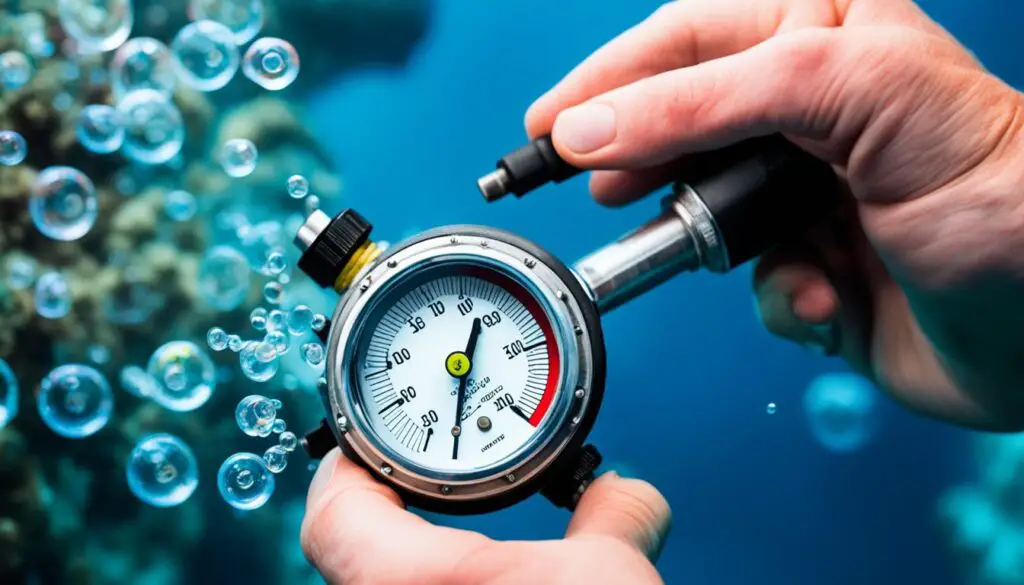Durable and reliable gear is key for a safe dive. It’s critical for both new and experienced divers. Let’s explore how to pick gear that lasts, using proven advice.
Quality materials are a must when selecting gear. Choose items made from tough materials like reinforced plastics, stainless steel, or titanium. These stand up to water’s tough conditions, last longer, and avoid rust.
Consider the gear’s design. Opt for items built with strength, featuring reinforced seams, and strong fasteners. Ensure it passed tests from trusted makers.
Think about how much effort your gear needs to stay top-notch. Some gear needs regular care to remain tough and reliable. Make sure you’re ready for this, including checking for local maintenance services.
Do your homework. Before buying, look up reviews and advice from seasoned divers. This consumer feedback can give you a clear look at how products really perform.
Key Takeaways:
- Choose dive equipment made from high-quality and durable materials like reinforced plastics, stainless steel, or titanium.
- Pay attention to the design and construction of the gear, ensuring it has reinforced seams, sturdy buckles, and robust mechanisms.
- Consider the maintenance requirements of the gear and be prepared to commit to regular servicing and cleaning.
- Read customer reviews and seek expert opinions to gain insights into the durability and longevity of the gear.
- Make an informed decision based on factual data and prioritize gear that has a proven track record of durability and reliability.
Regulators and Second Stage
Regulators help deliver air constantly when underwater. When picking one, think about your diving style and needs.
Connection Types: DIN vs. Yoke
You’ll first decide on DIN or Yoke. DIN is better for tech dives because it’s more reliable and less likely to have O-ring problems. Yoke is what most recreational divers use; it fits most cylinders.
Regulator Material: Titanium vs. Stainless Steel
Choosing the right material matters. Titanium regulators are lighter and great for fun dives, making your jaw less tired. But, they shouldn’t be used with deep-sea bottles. Stainless steel is tougher and stands up better in challenging dives.
The Need for Second Stage Regulators
Second stages deliver air to the mouthpiece. They make breathing smoother, crucial for deep or tough dives. You can get regulators with second stages already attached or buy them separately. Think about what you need for your dives.
Cleaning and keeping your regulator well-maintained is key, no matter the type you have. Always follow the maker’s advice on cleaning, keeping, and getting it serviced. This keeps your regulator working like new.

DIN vs. Yoke Comparison
| Aspect | DIN Regulators | Yoke Regulators |
|---|---|---|
| Connection Type | DIN (Deutsche Industrie Norm) | Yoke (A-clamp or INT) |
| Recommended for | Technical diving | Recreational diving |
| Main Benefits | More reliable, less prone to blowing O-rings | Compatible with most dive cylinders |
Dive Computers and Other Gear
Let’s move on to talk about dive computers. These are key for safe and fun diving trips. They come in many types, each suited for different diving styles.
You need to consider what kind of air you’ll be using with your dive computer. Some have cool extras like wireless transmitters. These extras can make your diving even better and supply you with useful info.
Choosing a good dive watch is also important. Look at its size, cost, how it works, and its look. Choose one that fits you and your diving needs. A dive watch does more than tell time. It’s also a fashion statement underwater.
Next, let’s talk about wetsuits, fins, and snorkels. Your wetsuit should be comfy and protect you. For fins, think about design, material, and how they fit your feet. Your snorkel should be easy to use and fit well.
That’s all about finding the best diving gear. Think about what’s important to you, like quality and what you like. With the right gear, your diving trips will be safe, fun, and unforgettable. Enjoy your time underwater!
FAQ
What should I consider when choosing dive regulators?
When picking dive regulators, think about connections like DIN or Yoke. Also, consider the material, like titanium or stainless steel. Decide if you need a second stage regulator too.
Which type of regulator is recommended for technical diving?
DIN regulators suit technical diving better. They are sturdier and tend to keep O-rings from blowing out.
What are the benefits of using titanium regulators?
Titanium regulators are perfect for lightness in recreational diving. Yet, be careful when using them for decompression stage bottles.
How should I clean and maintain dive regulators?
To keep dive regulators in top shape, clean them as the maker recommends. Maintenance is key for performance.
What factors should I consider when choosing a dive computer?
Consider gas mixture ability and extra features such as wireless transmitters when picking a dive computer.
What should I consider when choosing a dive watch?
Size, price, movement type, and style should all be considered when selecting a dive watch.
What factors should I consider when selecting a wetsuit?
Look at the material, seams, seals, zippers, and any body armor when picking a wetsuit.
What factors should I consider when choosing scuba fins?
Think about the blade design, foot pocket, material, and the strap system when picking scuba fins.
What features should snorkels have?
Good snorkels are comfortable and have purge or water-restricting valves. They must also have a flexible lower tube and a suitable upper tube.
